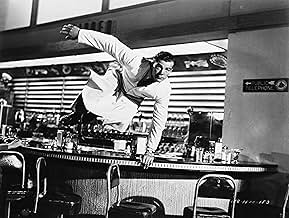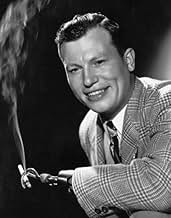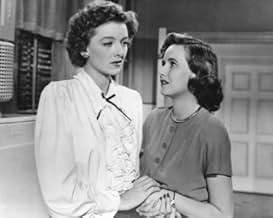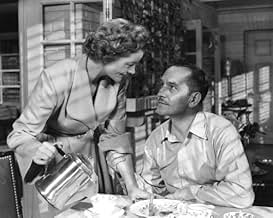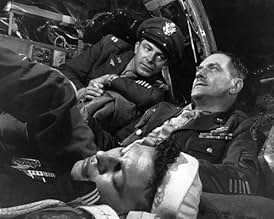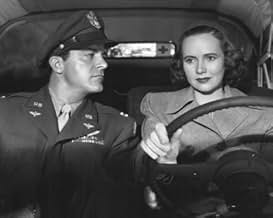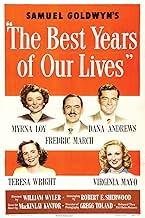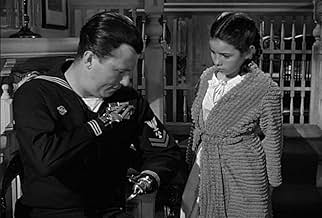Tre veterani della seconda guerra mondiale tornano a casa in una piccola città americana per scoprire che loro e le loro famiglie sono stati irrimediabilmente cambiati.Tre veterani della seconda guerra mondiale tornano a casa in una piccola città americana per scoprire che loro e le loro famiglie sono stati irrimediabilmente cambiati.Tre veterani della seconda guerra mondiale tornano a casa in una piccola città americana per scoprire che loro e le loro famiglie sono stati irrimediabilmente cambiati.
- Regia
- Sceneggiatura
- Star
- Vincitore di 7 Oscar
- 25 vittorie e 4 candidature totali
- Al Stephenson
- (as Frederic March)
Riepilogo
Recensioni in evidenza
Such a powerful film. At first the new lives of the soldiers seem to be facing small adjustments, such as their children's interest in "atomic energy" and "scientific efficiency". But soon we find that jobs are hard to find, and the wives and girlfriends sometimes met new people while the battles were fought.
Although a serious topic, the film has the right balance of entertainment and drama. It never gets outright depressing, and things like depression and suicide are overlooked. But it still remains a valuable lesson: as bad as dying in the war is, sometimes the transition back to normalcy can be just as damaging.
Although not one of the better known movies today (2014), "The Best Years of Our Lives" won seven Academy Awards in 1946, including Best Picture, Best Director (William Wyler), Best Actor (Fredric March), Best Supporting Actor (Harold Russell), Best Film Editing (Daniel Mandell), Best Adapted Screenplay (Robert Sherwood), and Best Original Score (Hugo Friedhofer). It still sits on the IMDb Top 250, just as it should.
Crafted with care, narrated with flair & incessantly human in its approach, William Wyler's film's silent, thoughtful contemplation on PTSD is still as relevant today as it was at its time of release. Firmly grounded in realism & having stood the test of time all these years, The Best Years of Our Lives is one of the finest offerings of its kind.
And while we don't often learn from history, we can be thankful that for once the United States of America did learn from what happened with its veterans after the previous World War. The GI Bill of Rights is mentioned in passing in The Best Years of Our Lives was possibly the greatest piece of social legislation from the last century. So many veterans did take advantage of it as do the veterans like Fredric March, Dana Andrews, and Harold Russell who you see here.
All three of those actors played archetypal veterans, characters that every corner of the USA could identify with. They all meet on an army transport plane flying to the home town of all of them, Boone City, Iowa.
War is a great leveler of class and distinction. Bank employee March, soda jerk Andrews, and high school football star Russell probably would never meet in real life even in a small town like Boone City. But they do meet and war forges indestructible bonds that can never be broken.
March is the oldest, a man with two children and Hollywood's perfect wife Myrna Loy. He settles in the first and the best. He has some wonderful scenes, getting cockeyed drunk on his return and later with a little bit of liquor in him, tells the bank officials at a banquet off in no uncertain terms.
I also love his scene where another returning veteran, a sharecropper wants to get a bank loan for his own piece of land. Watch March's expressions as he listens to the man's pitch for money. You can feel him read the man's soul. It's what got him his Second Best Actor Oscar for this film.
Harold Russell was a real veteran who lost both his hands during service in the Pacific. He got a special recognition Oscar for his performance. Because of that it was probably unfair to nominate him in the Supporting Actor category which he also won in. His performance, especially his scenes with Cathy O'Donnell as his sweetheart who loves him with or without his hands, is beyond anything that could be described as acting.
Dana Andrews is the only officer of the three, a bombardier in the Army Air Corps. Of the group of them, maybe he should have stayed in. He also comes from the poorest background of the group and he was an officer and a gentleman in that uniform. That uniform and those monthly allotment checks are what got Virginia Mayo interested enough to marry him. The problem is that he's considerably less in her eyes as a civilian.
While Mayo is fooling around with Steve Cochran, Andrews has the great good fortune to have March's daughter Teresa Wright take an interest in him. They're the main story of the film, Andrews adjustment to civilian life and adjusting to the fact he married the wrong woman. Not all veteran's problems were solved with GI Bill.
Myrna Loy gets little recognition for The Best Years of Our Lives. My guess is that it's because her role as wife was too much like the stereotypical wife roles she had patented over at MGM. Still as wife to March and mother to Wright she really is the glue that holds that family together.
The Best Years of Our Lives won for Best Picture for Sam Goldwyn, Best Director for William Wyler and a few others besides the two acting Oscars it got. It was a critical and popular success, possibly the best film Sam Goldwyn ever produced. It remains to this day an endearing and enduring classic and will be so for centuries. It's almost three hours in length, but never once will your interest wane.
The best tribute this film received came from Frank Capra who had a film of his own in the Oscar sweepstakes that year in several categories. In his memoirs he said that he was disappointed to be skunked at the Oscars that year, but that his friend and colleague William Wyler had created such a masterpiece he deserved every award he could get for it.
By the way, the film Capra had hopes for was It's A Wonderful Life. The Beat Years of Our Lives can't get better praise than that.
Definitely a family orientated movie (Cert U) this will appeal to and find favour with all ages, but don't start thinking that this is all gooey, slushy nonsense. There's some quite hard-hitting topics covered, even by today's standards and of course, with our minds on our current troops in Iraq/Afghanistan, equally relevant.
Multi-stranded, which each of the three G.I.'s immediate and extended families and friends being examined, it's about them coping, with varying degrees of success, with home life and getting jobs, now that the War is ended. It's the little observations and stories around them that are so fascinating, as the Heroes of yesterday are now anything but when it comes finding new purpose in a changed world.
The cast is exemplary, not necessarily the biggest stars of the day but the most believable and natural for their roles. Dana Andrews, Myrna Loy and Fredric Marsh are the ones most easily recognisable and their appearances convey a sort of reassuring familiarity and normality. They're all excellent, of course.
Though long, at nearly 3 hours, William Wyler's easy going but assured and tight direction keeps things flowing nicely and it never drags. This, my second viewing, is an enjoyable one as the first and if anything I'm more at ease with it.
Though obviously not as exciting or dramatic as other 'normal' war films, it's a tragedy that it's not more well known. I've never seen it to ever have been on TV, or to my recollection, even Sky Movies, for that matter. Any movie that won 7 Oscars and is currently no. 180 in the top 250 IMDb's films of all time, voted by its voters (us, the public) is hardly one of minority interest.
A friend I lent my DVD to watched it with his family and normally they only go for current films, or ones they know, but they not only enjoyed it, but felt enormously moved by it, too.
If you haven't seen The Best Years... yet, make a mental note to do so. Your life won't change by doing so, but it really is worth the 3 hours of it that it will take. You certainly can't say the same about every film out there....
Back in 1946, it was a jaw-dropper to have a character in a movie utter the word "divorce" or to aver an intent to break up a marriage -- such ideas just weren't voiced in films then. To modern audiences, they come across as melodramatic, but I'm told they elcited genuine gasps from audiences then.
Even more astonishing was William Wyler's decision to cast real-life amputee Harold Russell in the key role of a returning Navy veteran. Until <i>The Battle of Britain</i>, in which an actual, disfigured RAF veteran made a cameo appearance, directors didn't make those sorts of courageous gestures. The intimate yet innocent scene in which Homer Parrish (Russell) demonstrates his helplessness to his fiancé Wilma Cameron (Cathy O'Donnell) is beautiful, heartbreaking and uplifting; later, during the wedding scene, Russell stumbled over a line in saying the vows, and Wyler left the humanizing mistake in, God bless him for it.
Oscars Best Picture Winners, Ranked
Oscars Best Picture Winners, Ranked
Lo sapevi?
- QuizFor his performance as Homer Parrish, Harold Russell became the only actor to win two Academy Awards for the same role. The Academy Board of Governors thought he was a long shot to win, so they gave him an honorary award "for bringing hope and courage to his fellow veterans through his appearance." Later in the ceremony, he won for Best Supporting Actor.
- BlooperWhen Al introduces his wife and daughter to Fred and Homer at Butch's, he refers to Dana Andrews as Homer and Harold Russell as Fred. This was intended as a consequence of Al being drunk.
- Citazioni
[after Peggy tells her parents that they never had any trouble in their relationship]
Milly Stephenson: "We never had any trouble." How many times have I told you I hated you and believed it in my heart? How many times have you said you were sick and tired of me; that we were all washed up? How many times have we had to fall in love all over again?
- Curiosità sui creditiThe character played by Ray Teal (the Axis sympathizer whom Homer Parrish attacks at the soda fountain) is listed in the credits as "Mr. Mollett". However, the character's name is never mentioned or otherwise alluded to.
- Versioni alternativeThe film was modified to play on a wide screen and reissued on February 3, 1954.
- ConnessioniEdited into Assalto al cielo (1950)
- Colonne sonoreAmong My Souvenirs
(1927) (uncredited)
Music by Edgar Leslie
Lyrics by Lawrence Wright
Played on piano by Hoagy Carmichael
I più visti
Dettagli
- Data di uscita
- Paese di origine
- Lingua
- Celebre anche come
- Los mejores años de nuestras vidas
- Luoghi delle riprese
- Azienda produttrice
- Vedi altri crediti dell’azienda su IMDbPro
Botteghino
- Budget
- 2.100.000 USD (previsto)
- Lordo Stati Uniti e Canada
- 23.650.000 USD
- Lordo in tutto il mondo
- 23.667.133 USD
- Tempo di esecuzione2 ore 50 minuti
- Colore
- Proporzioni
- 1.37 : 1
Contribuisci a questa pagina



